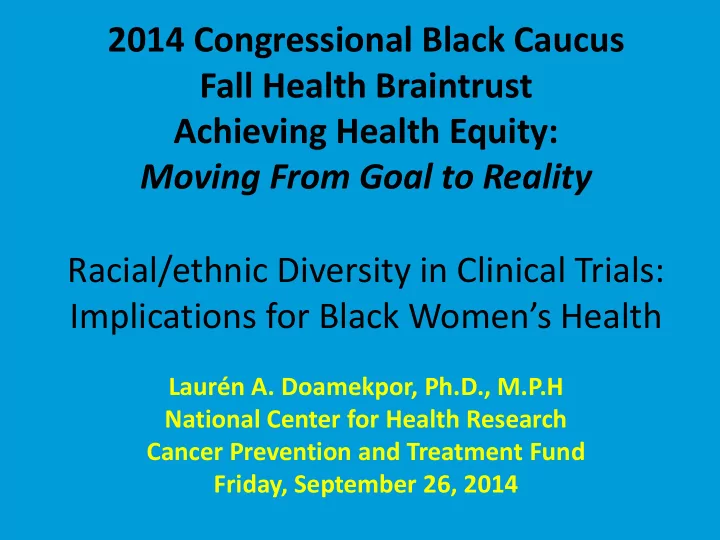

2014 Congressional Black Caucus Fall Health Braintrust Achieving Health Equity: Moving From Goal to Reality Racial/ethnic Diversity in Clinical Trials: Implications for Black Women’s Health Laurén A. Doamekpor, Ph.D., M.P.H National Center for Health Research Cancer Prevention and Treatment Fund Friday, September 26, 2014
CONTEXT • People of color and women have been historically underrepresented in clinical trials in the U.S. • Federal law requires DHHS to include people of color in research studies • African Americans represent 13% of the U.S. population but only 5% of clinical trial participants – in some studies not enough patients to know if a product is safe or effective • This is urgent because the health of millions is at stake
WHY IS THE FDA IMPORTANT? • Federal law require DHHS to include POC in research studies • BUT -- FDA is only health agency that is exempted from these federal requirements – Rationale: Studies submitted to FDA for approval are conducted and paid for by private companies NOT taxpayers • BUT -- FDA is responsible for ensuring the safety of packaged foods and the safety and effectiveness of medical products that touch each one of our lives.
WHY IS RACIAL/ETHNIC DIVERSITY IN CLINICAL TRIALS IMPORTANT? • Not about political correctness • Our understanding of disease biology is enhanced by analyzing the impact of race and ethnicity -- as imperfect as these categories are • Genetic variance based on different ancestry does exist and does play a role in health. • Percentage isn’t as important as having each group analyzed separately for safety and effectiveness
IMPLICATIONS FOR BLACK WOMEN'S HEALTH • Insufficient diversity in clinical trials reduces generalizability • Unknown and potentially inequitable distribution of risks and benefits to Black women • Limits potential to discover effects that may be relevant to Black women
IMPLICATIONS FOR BLACK WOMEN'S HEALTH • Results in health disparities because treatments have not been tested to be efficacious or safe for Black women • Eventually leads to disparities in health and mortality for various diseases
IMPLICATIONS FOR BLACK WOMEN'S HEALTH Female Breast Cancer Incidence and Death Rates per year per 100,000 women Racial/Ethnic Group Incidence Death All 127.8 25.5 African American/Black 118.3 33.8 White 132.5 25.0 Source: National Cancer Institute - 2000-2004
IMPLICATIONS FOR BLACK WOMEN'S HEALTH – Breast Cancer • Black women have the highest BC death rates of all racial and ethnic groups • Black women are 3 times more likely to die from BC but less likely to be diagnosed • Most BC clinical trials include mostly White women • Triple Negative BC is more common among Black women
IMPLICATIONS FOR BLACK WOMEN'S HEALTH Cervical Cancer Incidence and Death Rates per year per 100,000 women Racial/Ethnic Group Incidence Death All 8.7 2.6 African American/Black 11.4 4.9 White 8.5 2.3 Source: National Cancer Institute - 2000-2004
Examples from FDA Advisory Committee Meetings • VBLOC Weight-loss device trial – 93% of sample was White – Advisory committee voted in favor of approval this year • Sleep apnea device trial – Zero Black/African Americans – Advisory committee voted in favor of approval – FDA approved the device this year
FUTURE CONSIDERATIONS • Accountability is essential – A change in law is NOT needed. The FDA must stop approving drugs and devices that didn’t analyze and report data for major racial/ethnic groups – Recommendations for better diversity in post- market studies is not enough – Educating the public – including FDA officials and Advisors -- about importance of analyzing data by demographic groups
THANK YOU Contact Information: Laurén A. Doamekpor PhD, MPH Senior Fellow National Center for Health Research! Cancer Prevention and Treatment Fund 1001 Connecticut Avenue, NW, Suite 1100 Washington, D.C. 20036 (T) 202-223-4000 ld@center4research.org www.center4research.org www.stopcancerfund.org
Recommend
More recommend